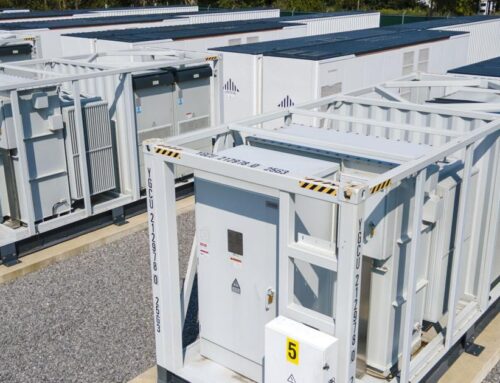Taiwan’s Energy Dilemma: Can Renewables Meet Demand?
October 2, 2025
Semiconductors and AI still require plenty of power

People enjoy an afternoon at a beach near the closed Maanshan Nuclear Power Plant in Pingtung County, Taiwan.
Taiwan failed to pass an August referendum on whether or not a nuclear plant should be restarted, if it were deemed safe to operate. While the more than 4 million votes for “yes” outnumbered the more than 1.5 million “no” votes, the number of affirmative votes failed to surpass the 25 percent threshold of eligible voters also required for the referendum to pass. As a result, Taiwan remains on the nuclear-free path it has followed since the shutdown of the nuclear plant in question, Maanshan nuclear power plant, in southern Taiwan on 17 May, fulfilling a 2016 government pledge made as a result of Japan’s 2011 Fukushima disaster.
However, high-tech industries including semiconductor manufacturing, AI data centers and AI infrastructure operators, will continue fueling electricity demand. The question remains as to whether or not Taiwan can deliver reliable, clean power to support the growth of these industries amid Chinese geopolitical pressure—and without nuclear energy.
Taiwan’s Nuclear Energy Debate
Taiwan’s energy landscape remains complex. Nuclear power, developed since the 1970s, has seen older reactors retired since 2018. Taiwan imports 95 percent of its energy and has a growing reliance on natural gas. But it also aims to reduce carbon emissions, improve grid reliability, and expand its energy storage options.
“Without energy, there’s no industrial growth… and nuclear is an excellent option,” NVIDIA CEO Jensen Huang said during a pre-referendum visit to Taipei on 22 August. He met with key players in high-tech supply chains, including Taiwan Semiconductor Manufacturing Company (TSMC), the world’s largest chip foundry producing advanced chips for smartphones, high-performance computing, and AI applications.
It was not Huang’s first time advocating for nuclear energy. During Computex Taipei in May he said, “We need energy from any single source: wind, solar, nuclear. Taiwan should absolutely invest in nuclear, and it shouldn’t be a stigma to have energy.”
Nvidia has been expanding in Taiwan, partnering with Foxconnand the government to build a 10,000-Blackwell GPU AI training and supercomputing facility in the south, opening a larger Taipei office, and collaborating with Taiwanese companies such as TSMC to build an AI infrastructure ecosystem.
Taiwan president Lai Ching-te promised to honor the referendum result while focusing on diverse energy sources. He said Taiwan might consider advanced nuclear options if technology improves, waste decreases, and public support grows.
In late August, the government approved a draft piece of legislation, the AI Basic Act, designed to create a supportive environment for AI development and use. The draft emphasizes the government’s role in promoting AI research, applications, and infrastructure. Meanwhile, the newly reshuffled Cabinet is under pressure by industry and the broader public to maintain energy security.
In mid-September, newly appointed Minister of Economic Affairs Ming-hsin Kung emphasized that Taiwan is a global hub for chips and technology, shaping strategies for the next 10 to 20 years.
Taiwan’s Renewable Energy Goals
Kung stressed that businesses require both stable power supply and green energy to meet commitments to 100 percent renewable energy from global corporate initiative RE110.He said the new Cabinet will continue focusing on renewable energy while adjusting rollout speed. The goal is to lift renewables to 20 percent of Taiwan’s power supply by the end of 2026—a challenging target critical in keeping Taiwan competitive in global supply chains. He estimated renewable energy will account for around 15 percent of power generation by the end of 2025, up from 11.9 percent in 2024.

For solar, Kung pledged to strengthen existing projects, resolve land-use conflicts with fish farms in solar-fishery initiatives, and replace older solar panels with newer ones that produce twice as much energy. Offshore wind construction will be accelerated, and a trial program for floating wind turbines will resume. Taiwan will also actively develop other green energy sources, such as geothermal and hydrogen.
On nuclear, Kung reaffirmed Taiwan’s nuclear-free path but left open the possibility of adopting advanced technologies like small modular reactors. Guidelines for evaluating potential restarts of existing plants will be released by the end of October. The first step will see the Taiwan Power Company (Taipower) conducting assessments of all three halted nuclear plants, with initial results due next year. Maanshan, which began commercial operations in 1984, is regarded as the most likely to pass the safety self-assessments, which will focus on the ability to maintain aging equipment and upgrade earthquake resilience.
In a report released on 26 September, Taiwan’s Energy Administration projects electricity demand to grow 1.7 percent annually from 2025 to 2034. The forecast factors in expansions to Taiwan’s semiconductor industry, investments in AI development, and expected energy savings.
To meet rising power demand, the government currently plans to boost natural gas generation while phasing out large nuclear, coal, and oil plants. Net additions of 12.2 gigawatts in gas-fired capacity are expected by 2034.
Semiconductor Industry Concerns
But high-tech industries express concern. In early September, at SEMICON Taiwan, Charles Lee, the managing director of Topco Group, a major semiconductor supplier, told IEEE Spectrum that manufacturers worry about grid stability as AI and semiconductor growth accelerates. “Highly polluting coal-fired plants are no longer an option, so we will rely more on liquefied natural gas and less-stable renewables. If nuclear plants could be restarted, I would personally welcome it,” Lee says.
Meanwhile, a memory manufacturing director, who spoke on condition of anonymity because he isn’t authorized by his company to speak to the media, told IEEE Spectrum that Taiwan’s economy is still manufacturing-driven. “We’re concerned about the low efficiency of green energy. We’ve also noticed a trend abroad, with countries resuming nuclear plant construction,” he says.
In a televised debate ahead of the August referendum, Tzu-Hsien Tung, chairman of Pegatron Corporation, voiced support for restarting nuclear power plants. He warned that if Taiwan continues to rely on carbon-heavy electricity, local firms could face steep carbon taxes overseas, undermining their global competitiveness.

As Taiwanese society debated whether to restart nuclear power plants, some Taiwanese energy experts, including Tze-Luen Lin, deputy executive director of the Taiwanese government’s Office of Energy and Carbon Reduction and a political science professor at National Taiwan University, have called for fresh approaches to Taiwan’s energy resilience amid ongoing Chinese threats, echoing to notions brought by non-governmental organizations and thinkthanks, such as the U.S.-based Center for Climate and Security, that a clean energy transition can strengthen national security.
At the Society for Environmental Economics and Policy Studies conference in Japan on 21 September, Lin highlighted that renewable energy is central to both energy and national security. He emphasized, “Energy resilience can only be strengthened through decentralized, locally sourced renewables, combined with microgrids and energy storage,” and warned that large, centralized power plants are easier targets for attack.
Commenting on Taiwan’s possible nuclear options, Jusen Asuka, a professor at Tohoku University and chair of the session in the conference, cautioned that SMRs remain immature and costly, and investing heavily in them could slow renewable energy development. development.
- “Too Cheap to Meter” Nuclear Power Revisited ›
- How Japan’s Earthquake Is Shaking Up Taiwan’s High-Tech Sector ›
- TSMC’s Energy Demand Drives Taiwan’s Geopolitical Future ›
Search
RECENT PRESS RELEASES
Could Netherlands’ Green Energy Boom Overload Power Grids?
SWI Editorial Staff2025-10-24T04:50:50-07:00October 24, 2025|
Could Netherlands’ Green Energy Boom Overload Power Grids?
SWI Editorial Staff2025-10-24T04:50:50-07:00October 24, 2025|
Could Netherlands’ Green Energy Boom Overload Power Grids?
SWI Editorial Staff2025-10-24T04:50:50-07:00October 24, 2025|
Letter: Renewable power should not be politicized
SWI Editorial Staff2025-10-24T04:50:00-07:00October 24, 2025|
Letter: Renewable power should not be politicized
SWI Editorial Staff2025-10-24T04:50:00-07:00October 24, 2025|
Letter: Renewable power should not be politicized
SWI Editorial Staff2025-10-24T04:50:00-07:00October 24, 2025|
Related Post




